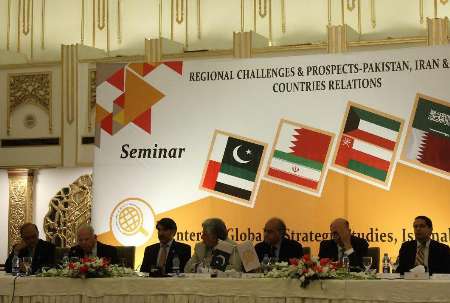
The speakers were all of the same view that all Muslim nations, especially Iran and the Persian Gulf states, should shun their differences and create an atmosphere of peace, development and prosperity in the region.
The aim and focus of the Seminar was to discuss the prevailing security challenges that are common to Pakistan, Iran and the Persian Gulf littoral states, while evaluating the prospects and possible ways forward that could be worked upon by the respective governments and law enforcement agencies to deal with the existing security threats.
Through the platform provided by the CGSS, many prospects were discussed that could be assertive for enhancing the security of the respective countries and for the development of mutually beneficial relations.
Mohammad Zahir Ul Islam Chairman of CGSS in his opening remarks emphasized the need for enhancing relations between Muslim nations.
Zahir Ul Islam further said that Pakistan shares an inimitable relation with Iran and other Persian Gulf Countries because of religious and cultural commonalities.
He also emphasized to introduce more forums for dialogues between these countries to iron out differences.
Major General Seyed Khalid Amir Jaffery, on his part, said that Pakistan has always enjoyed cordial relations with Iran and other Persian Gulf States.
“Iran has the unique distinction of being the country to accept and recognize Pakistan as a sovereign state after its independence on 14th August 1947,” Jaffery said.
Furthermore, Jaffery said, Pakistan and Iran are economic and strategic partners and have always helped each other during the times of conflict and also collaborate in terms of military cooperation.
“Although the relations between both, Iran and Pakistan, faced some ups and downs due to the strategic environment of the region but mostly they stay on the positive nodes,” he said.
The analyst also said that, Pakistan has always found itself close to the Persian Gulf States due to the religious affiliations.
A significant number of Pakistanis are residing in these Persian Gulf countries where they are contributing towards their development, the General said.
Meanwhile, according to Jaffery, Pakistan’s closeness to Saudi Arabia is undeniable due to the fact that each year hundreds and thousands of religious pilgrims visit the holy sites of Mecca and Medina to perform Umrah and Hajj, Seyed Khalid Amir said.
Also present at the event was Akram Zaki one the well-known veteran diplomats of Pakistan who delivered a speech on “Pakistan’s Future Policy towards Iran and Persian Gulf Region in the Backdrop of Current Environment”.
Zaki said that Iran and the Persian Gulf countries are very important for Pakistan “with whom we have historical, cultural, religious, economic, political and strategic relations.”
Unfortunately, this energy rich, strategically important, Muslim West Asia is in turmoil and facing multiple conflicts, in which major World Powers, Regional Powers and Non-State actors of various shades are fighting many battles in different dimensions, he said.
“It is difficult to identify who are allies and who are adversaries,” Zaki said.
Lieutenant General Khalid Naeem Lodhi was also among people who addressed the seminar, presenting an speech on “Security and Counter Terrorism Challenges in Pakistan, Iran and Persian Gulf Countries”.
Naeem Lodhi elaborated in detail on the roots of terrorist organizations and their hierarchical structure.
He also provided participants with a historical overview of terrorism.
According to Naeem Lodhi, difficulty in recruiting regular forces further gave rise to proxy wars.
He argued that prospects for success against terrorism are only possible through socio-economic, political and military actions.
Khalid Mahmood, a former Ambassador to both Iran and Saudi Arabia discussed future challenges and opportunities for strategic collaboration in the region.
Mahmood said that the regional nations must work together in the areas of mutual interest and they should focus on enhancing strategic relations.
By relying on his background as Pakistan’s former envoy to both Iran and Saudi Arabia, he had first-hand experience to share and gave relevant suggestions to the policymakers.
Khalid Aziz Babar, another diplomat attending the seminar, touched on the incredible business opportunities that exist between Pakistan, Iran and the Persian Gulf littoral states.
Babar said that the Persian Gulf region is the largest global oil supplier, adding that history suggests the demand for oil has never diminished.
Pakistan, Iran and the Persian Gulf states have always been a point of interest for the global powers as this region has tremendous business and investment opportunities, he said.
“Through business ventures we can further strengthen our bilateral ties which will yield into mutually beneficial situation for Pakistan, Iran and the Persian Gulf states.”
272**1723**2044
www.irna.ir
 solhkhabar | Peace International News Agency Peace International News Agency , Peace News , International Agency News of Peace
solhkhabar | Peace International News Agency Peace International News Agency , Peace News , International Agency News of Peace